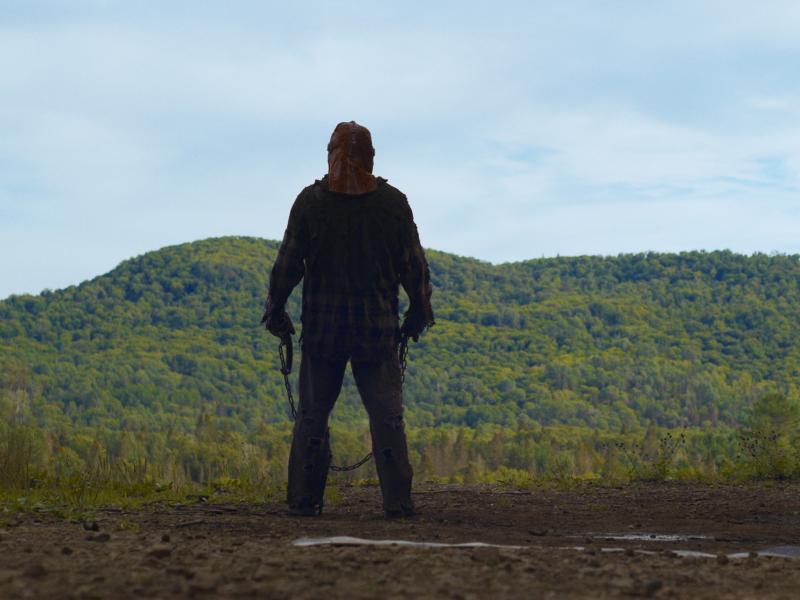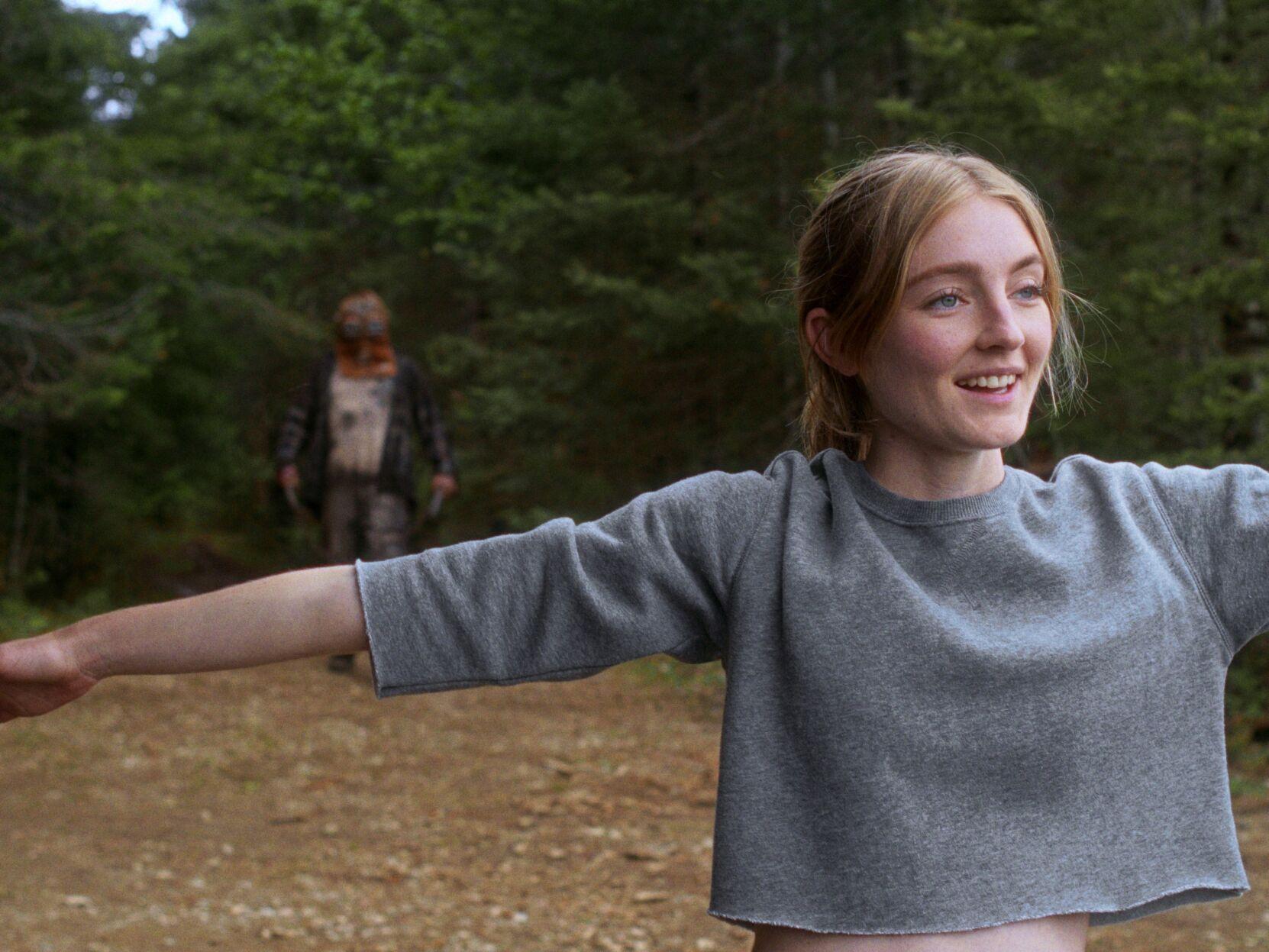In a Violent Nature review - inverted slasher is fascinating | reviews, news & interviews
In a Violent Nature review - inverted slasher is fascinating
In a Violent Nature review - inverted slasher is fascinating
Told entirely from a masked killer's perspective, this experiment is confident and strange

A group of young people rent a cabin in the woods. A masked killer lingers nearby. Surely you know how the rest unfolds. The slasher and its well-worn tropes have been parodied, satirised and subverted for as long as it has existed. In fact, we seem to prefer watching these deconstructions compared to the actual, pulpy thing. Scream is after all the most successful horror franchise in history.
But In a Violent Nature is arguably the most intriguing experiment in the genre so far. Here, the schlocky slasher is told from the perspective of a silent killer named Johnny who stalks a group of young adults after being awakened from his slumber. The premise sounds like the sort of passing thought you might have while lazily watching Friday the 13th Part III late at night. But director Chris Nash, making his feature debut, tackles the concept with poise and patience, stripping the slasher of its formal clichés and turning it into something artful and strangely serene. In a genre known for its lack of imagination, I can assure you haven’t seen anything like this before.
One of many inventive aspects is how Nash establishes the premise of a rote slasher through dribs and drabs of overheard conversations. Standing on the edge of the campfire we learn about Johnny, a child who was bullied and killed in an accident many years ago. The boys who were responsible were mysteriously found ripped apart and local folklore claims it was Johnny who got his revenge. Johnny is now buried in these very Ontario woods, but he can only rest if his dear mother’s locket is nearby, yes, the same one pocketed by a member of our doomed friend group in the opening scene. And off we go.  There are plenty of slashers that put the audience in the point of view of the killer. Michael Powell outraged audiences and the BBFC by doing so in Peeping Tom, and John Carpenter’s Halloween famously opens from Michael Myers point of view. But In a Violent Nature doesn’t place us in the driver's seat, instead Nash positions the camera behind Johnny, in a perspective more associated with open world video games than cinema. This creates an eerie objective quality, as if we are watching events occur outside the artifice of film. Combined with the lack of score, the earthy special effects (Nash’s previous work in film has been in special effects), and the familiar banter among the friends, the feeling of watching scenes from a film play out in real life is expertly realised.
There are plenty of slashers that put the audience in the point of view of the killer. Michael Powell outraged audiences and the BBFC by doing so in Peeping Tom, and John Carpenter’s Halloween famously opens from Michael Myers point of view. But In a Violent Nature doesn’t place us in the driver's seat, instead Nash positions the camera behind Johnny, in a perspective more associated with open world video games than cinema. This creates an eerie objective quality, as if we are watching events occur outside the artifice of film. Combined with the lack of score, the earthy special effects (Nash’s previous work in film has been in special effects), and the familiar banter among the friends, the feeling of watching scenes from a film play out in real life is expertly realised.
In a Violent Nature inverses nearly all formal elements of the slasher. This is a good time to mention that this is not a scary film. It is in fact devoid of tension, jumpscares or any of the affecting mechanisms the genre is known for. Instead, long tranquil stretches go by as we watch Johnny shuffle through the forest. The camera soaks in the scattered sunlights from the pine trees and often all we hear is pleasant bird song. The forest is captured beautifully by cinematographer Pierce Derks, giving an approximation of what a slasher directed by Terrence Malick would look like.
While Nash strips away the familiar formal elements, the subject matter of the slasher – a ruthless murderer finding creative ways to kill his victims – is kept intact. Keeping with the earthy realism of the film, the kills are unflinchingly graphic. But without a brooding score, the violence is weirdly sapped of horror, taking on a cold, matter of fact quality. The kills range from gnarly to Mortal Kombat levels of preposterous, but it is the experience of watching bodies being mangled, chopped up and dismembered in this deadpan way which leaves an uncanny impression. Here Nash has created the inverse of The Texas Chainsaw Massacre, a film which is remembered as gory but in fact has little to no on screen violence. These two films in a double bill would be a study in how sound design, allusion and framing are a horror film's most deadly weapons.
But the burning question the film doesn’t answer is: who is this actually for? The promotional material is keen to market it as a slasher, but those expecting one will be disappointed, as its low audience score on Rotten Tomatoes suggests. Those inclined towards arthouse cinema might dismiss the premise as a gimmick and roll their eyes at the gratuitous gore. So is it merely a nerdy exercise for genre aficionados? There is an element of that, sure. But I do believe that those who agree to meet this film on its own strange terms will be pleasantly surprised.
The future of Arts Journalism
You can stop theartsdesk.com closing!
We urgently need financing to survive. Our fundraising drive has thus far raised £49,000 but we need to reach £100,000 or we will be forced to close. Please contribute here: https://gofund.me/c3f6033d
And if you can forward this information to anyone who might assist, we’d be grateful.

Subscribe to theartsdesk.com
Thank you for continuing to read our work on theartsdesk.com. For unlimited access to every article in its entirety, including our archive of more than 15,000 pieces, we're asking for £5 per month or £40 per year. We feel it's a very good deal, and hope you do too.
To take a subscription now simply click here.
And if you're looking for that extra gift for a friend or family member, why not treat them to a theartsdesk.com gift subscription?
more Film
 The Mastermind review - another slim but nourishing slice of Americana from Kelly Reichardt
Josh O'Connor is perfect casting as a cocky middle-class American adrift in the 1970s
The Mastermind review - another slim but nourishing slice of Americana from Kelly Reichardt
Josh O'Connor is perfect casting as a cocky middle-class American adrift in the 1970s
 The Perfect Neighbor, Netflix review - Florida found-footage documentary is a harrowing watch
Sundance winner chronicles a death that should have been prevented
The Perfect Neighbor, Netflix review - Florida found-footage documentary is a harrowing watch
Sundance winner chronicles a death that should have been prevented
 Blu-ray: Le Quai des Brumes
Love twinkles in the gloom of Marcel Carné’s fogbound French poetic realist classic
Blu-ray: Le Quai des Brumes
Love twinkles in the gloom of Marcel Carné’s fogbound French poetic realist classic
 Frankenstein review - the Prometheus of the charnel house
Guillermo del Toro is fitfully inspired, but often lost in long-held ambitions
Frankenstein review - the Prometheus of the charnel house
Guillermo del Toro is fitfully inspired, but often lost in long-held ambitions
 London Film Festival 2025 - a Korean masterclass in black comedy and a Camus classic effectively realised
New films from Park Chan-wook, Gianfranco Rosi, François Ozon, Ildikó Enyedi and more
London Film Festival 2025 - a Korean masterclass in black comedy and a Camus classic effectively realised
New films from Park Chan-wook, Gianfranco Rosi, François Ozon, Ildikó Enyedi and more
 After the Hunt review - muddled #MeToo provocation
Julia Roberts excels despite misfiring drama
After the Hunt review - muddled #MeToo provocation
Julia Roberts excels despite misfiring drama
 London Film Festival 2025 - Bradley Cooper channels John Bishop, the Boss goes to Nebraska, and a French pandemic
... not to mention Kristen Stewart's directing debut and a punchy prison drama
London Film Festival 2025 - Bradley Cooper channels John Bishop, the Boss goes to Nebraska, and a French pandemic
... not to mention Kristen Stewart's directing debut and a punchy prison drama
 Ballad of a Small Player review - Colin Farrell's all in as a gambler down on his luck
Conclave director Edward Berger swaps the Vatican for Asia's sin city
Ballad of a Small Player review - Colin Farrell's all in as a gambler down on his luck
Conclave director Edward Berger swaps the Vatican for Asia's sin city
 London Film Festival 2025 - from paranoia in Brazil and Iran, to light relief in New York and Tuscany
'Jay Kelly' disappoints, 'It Was Just an Accident' doesn't
London Film Festival 2025 - from paranoia in Brazil and Iran, to light relief in New York and Tuscany
'Jay Kelly' disappoints, 'It Was Just an Accident' doesn't
 Iron Ladies review - working-class heroines of the Miners' Strike
Documentary salutes the staunch women who fought Thatcher's pit closures
Iron Ladies review - working-class heroines of the Miners' Strike
Documentary salutes the staunch women who fought Thatcher's pit closures
 Blu-ray: The Man in the White Suit
Ealing Studios' prescient black comedy, as sharp as ever
Blu-ray: The Man in the White Suit
Ealing Studios' prescient black comedy, as sharp as ever
 The Woman in Cabin 10 review - Scandi noir meets Agatha Christie on a superyacht
Reason goes overboard on a seagoing mystery thriller
The Woman in Cabin 10 review - Scandi noir meets Agatha Christie on a superyacht
Reason goes overboard on a seagoing mystery thriller

Add comment